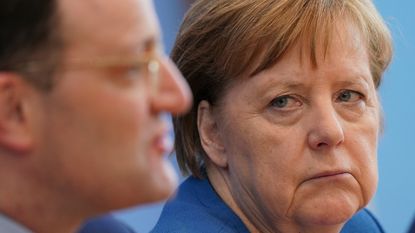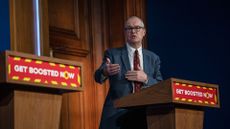Germany U-turns on Oxford-AstraZeneca vaccine
Berlin rolling out UK-developed jab to over-65s after doubts about efficacy disproved

German health officials have paved the way for the rollout of the Oxford-AstraZeneca vaccine to be extended to the country’s over-65s after drastically revising official guidance on the Covid jab.
The Health Ministry’s independent vaccine committee reversed a recommendation not to use the UK-developed jab to inoculate older people following a review of data from other nations’ vaccine campaigns.
As Sky News notes, Germany “had previously claimed that there was not enough reliable efficacy data” to allow the vaccine to be used on high-risk groups - a verdict that prompted other European countries including Denmark, the Netherlands and Sweden to adopt similar policies.
Subscribe to The Week
Escape your echo chamber. Get the facts behind the news, plus analysis from multiple perspectives.

Sign up for The Week's Free Newsletters
From our morning news briefing to a weekly Good News Newsletter, get the best of The Week delivered directly to your inbox.
From our morning news briefing to a weekly Good News Newsletter, get the best of The Week delivered directly to your inbox.
The doubters’ fears appeared by be verified by German media reports that the efficacy of the Oxford jab was as low as 8% in recipients aged over 65.
But that claim was swiftly rubbished - and in the wake of fresh research, now Berlin is U-turning to follow the UK’s lead in offering the Oxford jab for over-65s. Germany is also set to adopt the policy of delaying the second dose by 12 weeks - as the UK is doing - after studies found that widening the gap improves the efficacy of the vaccine.
Health Minister Jens Spahn said the policy shift was “good news for older people” because “they will get vaccinated faster”.
The change in strategy comes days after France approved the Oxford jab for use on people aged 65 to 74 with underlying health conditions. French President Emmanuel Macron had previously claimed that the vaccine was only “quasi-ineffective” on pensioners.
Sign up for Today's Best Articles in your inbox
A free daily email with the biggest news stories of the day – and the best features from TheWeek.com
While officials in both Berlin and Paris have had a rethink, however, public trust in the vaccine remains low.
Vaccination centres in Berlin are reporting that patients due to have the jab are not turning up for appointments.
And figures released by the French Health Ministry reveal a similar trend. Euractiv reports that only 273,000 doses of the jab have been administered in France “out of 1.7 million received as of end-February”.
The head of the MG France doctors’ union, Jacques Battistoni, last week denounced the “AstraZeneca bashing”, while the country’s vaccination coordinator, Alain Fischer, said that the “bad press” about the vaccine was “deeply unfair”.
Create an account with the same email registered to your subscription to unlock access.
Joe Evans is the world news editor at TheWeek.co.uk. He joined the team in 2019 and held roles including deputy news editor and acting news editor before moving into his current position in early 2021. He is a regular panellist on The Week Unwrapped podcast, discussing politics and foreign affairs.
Before joining The Week, he worked as a freelance journalist covering the UK and Ireland for German newspapers and magazines. A series of features on Brexit and the Irish border got him nominated for the Hostwriter Prize in 2019. Prior to settling down in London, he lived and worked in Cambodia, where he ran communications for a non-governmental organisation and worked as a journalist covering Southeast Asia. He has a master’s degree in journalism from City, University of London, and before that studied English Literature at the University of Manchester.
-
 Today's political cartoons - April 13, 2024
Today's political cartoons - April 13, 2024Cartoons Saturday's cartoons - moderate MAGA, automotive politics, and more
By The Week US Published
-
 5 Grand Canyon-size cartoons on the Arizona abortion ruling
5 Grand Canyon-size cartoons on the Arizona abortion rulingCartoons Artists take on a chasm in reproductive freedom, the dangers of an abortion ban, and more
By The Week US Published
-
 Crossword: April 13, 2024
Crossword: April 13, 2024The Week's daily crossword
By The Week Staff Published
-
 Covid four years on: have we got over the pandemic?
Covid four years on: have we got over the pandemic?Today's Big Question Brits suffering from both lockdown nostalgia and collective trauma that refuses to go away
By Chas Newkey-Burden, The Week UK Published
-
 The hollow classroom
The hollow classroomOpinion Remote school let kids down. It will take much more than extra tutoring for kids to recover.
By Mark Gimein Published
-
 Excess screen time is making children only see what is in front of them
Excess screen time is making children only see what is in front of themUnder the radar The future is looking blurry. And very nearsighted.
By Devika Rao, The Week US Published
-
 Covid-19: what to know about UK's new Juno and Pirola variants
Covid-19: what to know about UK's new Juno and Pirola variantsin depth Rapidly spreading new JN.1 strain is 'yet another reminder that the pandemic is far from over'
By Arion McNicoll, The Week UK Published
-
 Long-term respiratory illness is here to stay
Long-term respiratory illness is here to stayThe Explainer Covid is not the only disease with a long version
By Devika Rao, The Week US Published
-
 Covid inquiry: the most important questions for Boris Johnson
Covid inquiry: the most important questions for Boris JohnsonTalking Point Former PM has faced weeks of heavy criticism from former colleagues at the public hearing
By The Week Staff Published
-
 China's pneumonia cases: should we be worried?
China's pneumonia cases: should we be worried?The Explainer Experts warn against pushing 'pandemic panic button' following outbreak of respiratory illness
By Keumars Afifi-Sabet, The Week UK Published
-
 Vallance diaries: Boris Johnson 'bamboozled' by Covid science
Vallance diaries: Boris Johnson 'bamboozled' by Covid scienceSpeed Read Then PM struggled to get his head around key terms and stats, chief scientific advisor claims
By The Week UK Published